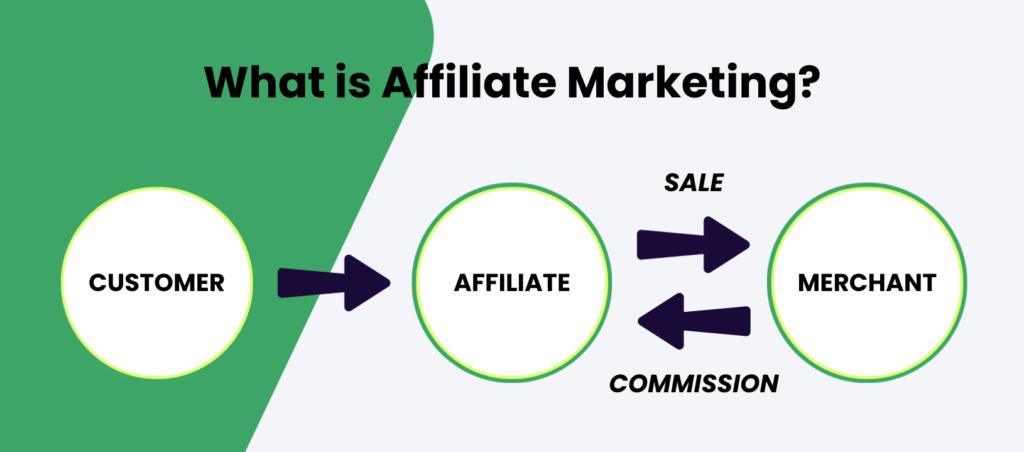Affiliate marketing is a buzzword in the world of online business, but what exactly does it entail, and why do affiliate marketing? You’ve come to the right place if you’re new to the concept or seeking a refresher. In this comprehensive guide, we’ll break down the fundamentals of affiliate marketing, exploring what it is, how it works, and why it has become such a popular and lucrative venture in the digital age.
Understanding Affiliate Marketing
Put simply, affiliate marketing is when an individual (the affiliate) sends customers to a business and gets a commission or reward when the customer makes a purchase. A common way for affiliate marketers to send customers to businesses is through links in content the affiliate has created, such as blog posts, articles, or social media content.
Let’s look at an example. Say an affiliate marketer for Lenovo writes a blog post detailing the benefits of Lenovo laptops. Within the blog post, the affiliate places links to Lenovo’s website. When a reader clicks on the links in the article and goes to Lenovo’s website, they might just make a purchase. If they do, the affiliate marketer will get a commission on the purchase. So the customer finds the Lenovo laptops through the affiliate’s marketing efforts, i.e. a blog post. The customer clicks the affiliate links in the post, and thus the potential sale is passed through the affiliate link to Lenovo’s website, where actual sales result in a commission for the affiliate.
This symbiotic relationship between the affiliate and the business benefits both, creating a win-win scenario.
The Key Players
- Merchant or Retailer: This is the company or business that offers a product or service and seeks to expand its reach through affiliate marketing. Merchants provide affiliates with unique tracking links, banners, and promotional materials to aid their marketing efforts. Not all companies have affiliate programs, and every affiliate program has different rules for joining and participating in the program.
- Affiliate: An affiliate is an independent marketer or content creator who partners with the merchant to promote their products or services. Affiliates earn commissions or fees for each successful referral or sale they generate through their marketing channels.
How Affiliate Marketing Works
- Affiliate Promotion: Affiliates use various online channels such as blogs, websites, social media, email marketing, or platforms like TikTok or YouTube to promote the merchant’s products or services. They embed unique tracking links within their content to monitor their referrals accurately.
- Customer Engagement: When a potential customer clicks on the affiliate’s tracking link and makes a purchase on the merchant’s website, the affiliate’s role is complete.
- Tracking and Analytics: Advanced tracking technology records the referral, attributing it to the specific affiliate who drove the sale. This technology ensures that affiliates receive fair compensation for their marketing efforts.
- Compensation: Affiliates are compensated based on predefined terms. Compensation models may include pay-per-sale, pay-per-click, or pay-per-lead, depending on the particular business involved.
Why Do Affiliate Marketing
Affiliate marketing has gained popularity due to its many advantages:
Low Entry Barrier
Anyone can become an affiliate, making it accessible to newcomers in the digital marketing world. You don’t need a lot of experience or a lot of money just to get started. Pretty much everything you need to know you can teach yourself – you don’t a degree, a special certification, or massive social following to get started. Just be willing to learn, work hard, and develop your skillset. Not every affiliate marketer makes millions, but plenty of people make a full time income, and even more make a significant side hustle.
Passive Income Potential
Successful affiliates can generate passive income by promoting products or services they genuinely believe in. Passive income means that you keep making money even when you’re not working – unlike your typically hourly or salaried position, where as soon as you clock out or leave the office you stop making money. With passive income, your income isn’t tied to whether or not you’re on the clock. People can encounter and click on your affiliate links any time of the day or night, which means you have the potential to earn at any time of the day or night. As Warren Buffet once famously said,
“If you don’t find a way to make money while you sleep, you will work until you die.”
Passive income opportunities are one way to make money while you sleep.
Related: How Much Money Can You Make with Affiliate Marketing?
Diverse Income Streams
Affiliates can work with multiple merchants, diversifying their income sources. You’re not dependent on just one source for your revenue; rather, you can partner with multiple affiliate programs and networks, so if one ever goes down you still have the others. It can be tempting to stick with just one affiliate network, such as Amazon affiliates, but the more you diversify your partner base the more stable your foundation for passive income will be and the better you’ll be able to weather the ups and downs of any single merchant.
No Product Creation
Affiliates don’t need to create or manage products to sell; they focus solely on promotion. Life is (relatively) simple compared to many other types of business – no inventory to manage, dealing with sales tax or returns, no customer-facing service contracts. That being said, as your knowledge of affiliate marketing grows you may become interested in creating products to sell of your own, such as course, printables, digital assets, coaching, etc. While creating those kinds of products can definitely be rewarding and worthwhile, it isn’t necessary for affiliate marketing in and of itself.
Scalability
Affiliates can scale their efforts by expanding their reach or partnering with additional merchants. Once you get the basics down with your first affiliate project, you can replicate that by creating more affiliate marketing channels in more niches, multiplying your income as you scale.
Final Thoughts
In essence, affiliate marketing is a performance-based marketing strategy that rewards affiliates for driving traffic and sales to a merchant’s products or services. It’s a dynamic and mutually beneficial arrangement that has the potential to create income streams and opportunities for individuals in the digital age. As you delve deeper into the world of affiliate marketing, you’ll discover various strategies, tools, and tactics to maximize your success in this exciting field. Affiliate marketing is an excellent way to combine content creation and income, and is particularly suited to those who enjoy creating digital content, sharing information, and engaging with digital audiences through social media platforms.














